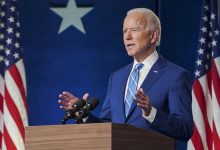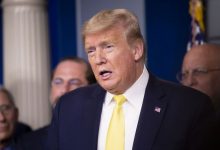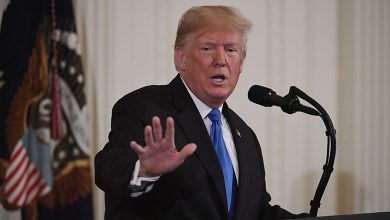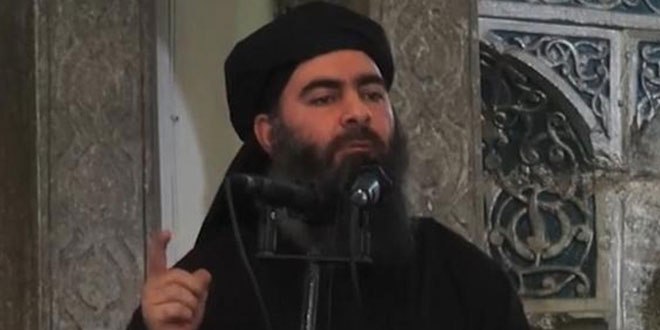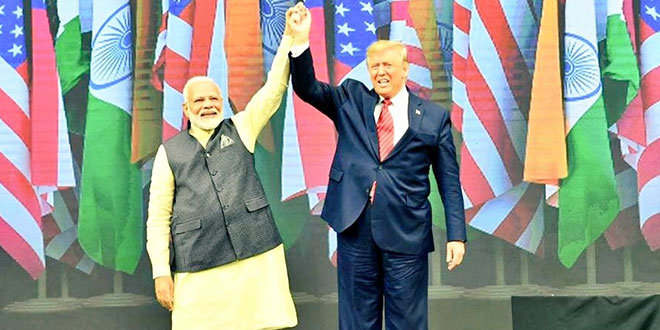
US President Donald Trump has declared a national emergency over the coronavirus outbreak in the country and reached an agreement with the Democrats on a relief package.
The national emergency he declared on Friday will make more funds available for fighting the fallout of the disease and cut red tape for finding medical solutions while its symbolism will reflect the seriousness of the situation.
Later, both he and Speaker Nancy Pelosi said that a deal had been reached to pass a relief package to help those after by the pandemic.
The Democrat-controlled House of Representatives was scheduled to vote on it Friday night and Republican-majority Senate was expected to approve it on Monday after cancelling its spring recess.
The battered stock markets zoomed as Trump declared the national emergency at a White House news conference. After having plummeted by more than 9 per cent on Thursday, the markets gained about the same percentage, most of the uptick coming dramatically while Trump spoke.
Trump said the emergency declaration was “to unleash the full power of the federal government” and that up to $50 billion will be available to states and territories to meet the challenge.
He said: “I’m urging every state to set up emergency operations centres effective immediately.”
Trump said that under the emergency the rules would be made flexible to allow doctors and hospitals to deal with the crisis.
Health Secretary Alex Azar and the Food and Drug Administration (FDA) will be empowered to waive rules for developing medications and tests and for promoting telemedicine.
The declaration came as the number of coronavirus cases in the US hit 1,800 with 41 deaths hitting all aspects of life from the economy and politics to education and entertainment.
Although Trump had criticised the relief package proposed by the Democratic Party during the news conference, he tweeted his support for it asserting it includes his “direction” for free coronavirus tests and paid sick leave.
Pelosi wrote to her fellow Democrats that they had reached an agreement on the package to be known as the Families First Coronavirus Response Act.
Treasury Secretary Steve Mnuchin negotiated the deal on behalf of the Trump administration as the President and the Republican leaders in Congress have bad relations with Pelosi, having traded personal insults.
In keeping with the Republican philosophy of involving the private sector Trump announced several initiatives with corporations while declaring the emergency.
The showpiece of the private-public partnership is an initiative with Google that will enable people to screen themselves online to see if they needed a COVID-19 test and if they are a candidate for it where to get it.
Trump said that 1,700 engineers will be working on the projects with Google.
He met with several executives of private companies before the news conference to work out their participation and some of them spoke to the media about their programmes.
The retailer Walmart with a large national footprint and others said they will make available their facilities for COVID-19 testing.
Trump defended his administration’s response to the crisis saying that it was following the procedures in place that were not designed for a crisis like the coronavirus and that changes would be made to deal with similar crises should they arise in the future.
Seema Verma, who heads the two separate federal health insurance programmes for senior citizens and for the poor, noted that a lot of the deaths were among older people and said that several new regulations are being put in place to protect those in nursing homes for the elderly.
Pressed by a reporter who accused him of being “selfish” by not getting himself tested for the coronavirus after having been photographed in the company of someone who had come done with it, Trump said that he would undergo the test but would not say when or commit to making it public.
Trump and medical experts with him said that people should undergo tests only when a doctor advises them to take them.
He declared the emergency under a 1988 law for funnelling aid to states and local administrations.
Unlike in India, a state of emergency in the US does not involve limiting civil rights and it only paves the way for providing funds for dealing with the fallout of the coronavirus and for relaxing laws and regulations to speed up medical response.
Senate Republican leader Chuck Schumer has said that under the law known as the Stafford Act $42.6 billion could be immediately available from the Disaster Relief Fund.
Trump has been under criticism for his handling of the coronavirus crisis by not responding soon enough or adequately.
Schumer and 35 other senators had written to Trump on Wednesday asking him to declare the state of emergency to make the funds available.
